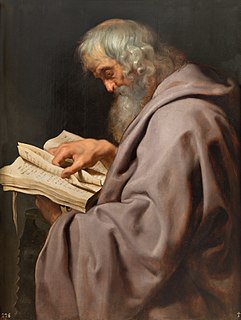This page is based on this
Wikipedia article Text is available under the
CC BY-SA 4.0 license; additional terms may apply.
Images, videos and audio are available under their respective licenses.

Boudica or Boudicca was a queen of the British Celtic Iceni tribe who led an uprising against the occupying forces of the Roman Empire in AD 60 or 61. She died shortly after its failure and was said to have poisoned herself. She is considered a British folk hero.
Year 97 BC was a year of the pre-Julian Roman calendar. At the time it was known as the Year of the Consulship of Lentulus and Crassus. The denomination 97 BC for this year has been used since the early medieval period, when the Anno Domini calendar era became the prevalent method in Europe for naming years.

Simon the Zealot or Simon the Cananite or Simon the Cananaean was one of the most obscure among the apostles of Jesus. A few pseudepigraphical writings were connected to him, and the theologian and Doctor of the Church, Saint Jerome, does not include him in De viris illustribus written between 392–393 AD.

Caistor is a town and civil parish situated in the West Lindsey district of Lincolnshire, England. As its name implies, it was originally a Roman castrum or fortress. It lies at the north-west edge of the Lincolnshire Wolds, on the Viking Way, and just off the A46 between Lincoln and Grimsby, at the A46, A1084, A1173 and B1225 junction. It has a population of 2,601. Its name comes from the Anglo-Saxon ceaster and was given in the Domesday Book as Castre.
Quintus Pompeius Falco was a Roman senator and general of the early 2nd century AD. He was governor of several provinces, most notably Roman Britain, where he hosted a visit to the province by the Emperor Hadrian in the last year. Falco achieved the rank of suffect consul for the nundinium of September-December 108 with Marcus Titius Lustricus Bruttianus as his colleague.
Warrior Queen is a British television series made by Thames Television for ITV that was broadcast from 20 February to 27 March 1978.
This article concerns the period 99 BC – 90 BC.
Lucius Valerius Flaccus was the name of several notable Romans of the Republican era, who were patricians from the gens Valeria. Six held consulships in the period from 261 BC to 86 BC; one also held a censorship.
Gaius Appuleius Decianus was tribune of the plebs in 98 BC, known primarily for his connection to politically motivated prosecutions in the Late Roman Republic.
Decimus Laelius was a tribune of the plebs of the Roman Republic in 54 BC. In 59 BC, he was the lead prosecutor in the extortion case against L. Valerius Flaccus, who was defended by Cicero in the speech Pro Flacco.
The gens Appuleia, occasionally written Apuleia, was a plebeian family at ancient Rome, which flourished from the fifth century BC into imperial times. The first of the gens to achieve importance was Lucius Appuleius, tribune of the plebs in 391 BC.
The Euryclids were a prominent Spartan family holding important offices starting in the 1st century BCE.
Boadicea is a 1927 British historical film directed by Sinclair Hill and starring Phyllis Neilson-Terry, Lillian Hall-Davis and Clifford McLaglen. It depicts the life of the Celtic Queen Boudica (Boadicea) and her rebellion against the Roman Empire.
Quintus Pompeius Senecio Sosius Priscus was a Roman military officer and senator who was appointed consul during the reign of Marcus Aurelius.
Lucius Aemilius Mamercinus Privernas was a Roman statesman who served as the consul in 341 and 329 BC, Magister Equitum in 342, Dictator in 335 and 316, and Interrex in 326.
Gaius Plautius Decianus was a Roman statesman who served as consul with Lucius Aemilius Mamercinus Privernas in 329 BC. He was awarded a triumph for his victories against the Privernates.
Titus Pomponius Bassus was a Roman senator who held a number of imperial appointments. He was suffect consul in the nundinium of September-December 94 as the colleague of Lucius Silius Decianus.




